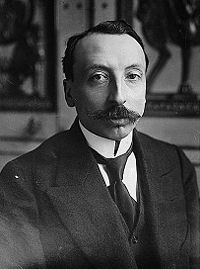
Léon Bérard
Encyclopedia

Politician
A politician, political leader, or political figure is an individual who is involved in influencing public policy and decision making...
and lawyer
Lawyer
A lawyer, according to Black's Law Dictionary, is "a person learned in the law; as an attorney, counsel or solicitor; a person who is practicing law." Law is the system of rules of conduct established by the sovereign government of a society to correct wrongs, maintain the stability of political...
.
He was Minister of Public Instruction in 1919 and from 1921 to 1924, and Minister of Justice
Minister of Justice (France)
The Ministry of Justice is controlled by the French Minister of Justice , a top-level cabinet position in the French government. The current Minister of Justice is Michel Mercier...
from 1931 to 1932 and was elected to the Académie française
Académie française
L'Académie française , also called the French Academy, is the pre-eminent French learned body on matters pertaining to the French language. The Académie was officially established in 1635 by Cardinal Richelieu, the chief minister to King Louis XIII. Suppressed in 1793 during the French Revolution,...
in 1934.
Bérard was the Ambassador from Vichy France
Vichy France
Vichy France, Vichy Regime, or Vichy Government, are common terms used to describe the government of France that collaborated with the Axis powers from July 1940 to August 1944. This government succeeded the Third Republic and preceded the Provisional Government of the French Republic...
to the Holy See
Holy See
The Holy See is the episcopal jurisdiction of the Catholic Church in Rome, in which its Bishop is commonly known as the Pope. It is the preeminent episcopal see of the Catholic Church, forming the central government of the Church. As such, diplomatically, and in other spheres the Holy See acts and...
from 1940 to 1945.
Léon Bérard and esperanto
Léon Bérard was strongly opposed to esperantoEsperanto
is the most widely spoken constructed international auxiliary language. Its name derives from Doktoro Esperanto , the pseudonym under which L. L. Zamenhof published the first book detailing Esperanto, the Unua Libro, in 1887...
, which he considered an instrument of Internationalism
Proletarian internationalism
Proletarian internationalism, sometimes referred to as international socialism, is a Marxist social class concept based on the view that capitalism is now a global system, and therefore the working class must act as a global class if it is to defeat it...
and a potential rival of French as a diplomatic language. As Minister of Public Instruction he banned the teaching or the promotion of esperanto in public schools, and had a prominent role in the rejection by the League of Nations
League of Nations
The League of Nations was an intergovernmental organization founded as a result of the Paris Peace Conference that ended the First World War. It was the first permanent international organization whose principal mission was to maintain world peace...
of a resolution in favor of the adoption of esperanto as an auxiliary international language.

